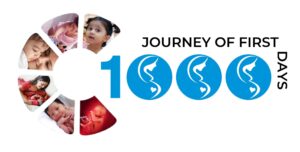
Journey Of First 1000 Days
“The First 1000 Days,” refers to the critical window of time from conception until a child’s 2nd birthday.

This period lays the foundation for your child’s lifelong health, growth, immunity, brain development and even focuses on mother’s health. The nutrition and care a child receives during this time can set the foundation for a lifetime of health.
As a pediatric nutritionist, I often remind parents that these 1,000 days are a once-in-a-lifetime opportunity to give your child the best possible start. Let’s understand…
Why First 1000 Days Are So Crucial?
-
Brain Development
Nearly 80% of a child’s brain development happens by age two. Nutrients like DHA, iron, choline and protein play a direct role in memory, focus and learning abilities.
-
Physical Growth
Babies double their birth weight in just a few months and triple it by their first birthday. Adequate nutrition supports strong bones, healthy muscles and overall growth.
-
Immunity
The foundation of the immune system is laid in this period. A strong immune system reduces the risk of frequent infections.
-
Future Health
Poor nutrition early in life increases the risk of obesity, diabetes, high blood pressure and even heart disease later in adulthood.
-
Habit Building
We guide both parents and children to ensure sustainable results. Kids learn to make independent health choices as they grow.
-
Daily Support for Parents
Accountability is key. We offer daily handholding for real-life challenges and share simple, relevant recipes for smooth implementation.
The Three Stages of the 1000 Days

1. Pregnancy (9 Months)
What you eat, hear, feel & think impacts the babies development so along with right nutrition including activities for good mental & emotional well being of the mother is equally important..
- Nutrients like folate, iron, calcium and protein are vital for your baby’s brain, bone, and organ development
- Stay hydrated and focus on restful sleep
- Avoid processed foods and excessive caffeine
A healthy pregnancy diet isn’t about eating more; it’s about eating right.
2. Infancy (Birth – 6 Months)
Breast milk is nature’s first superfood. It is perfectly designed for your baby, containing antibodies, enzymes and the right balance of nutrients.
- Exclusive breastfeeding for the first six months is recommended.
- For mothers, the right diet still matters as all the nourishment of the baby’s growth comes only via breast milk.
If breastfeeding is not possible, consult a pediatric nutritionist for safe alternatives.
3. Toddlerhood (6 – 24 Months)
After six months, breast milk alone is no longer enough. Complementary foods should be introduced, but breastfeeding should be continued alongside.
- Start with liquid and slowly progress to mashed foods like fruits, vegetables, and iron-rich cereals.
- Gradually introduce textures and family foods to prevent picky eating.
- Offer meals in a distraction-free environment (no TV or mobile phones).
- Include a rainbow of foods to ensure a variety of nutrients.
Common Mistakes Parents Make
❌ Introducing solids too early or too late
❌ Relying heavily on packaged or instant foods
❌ Skipping important micronutrients like iron & vitamin D
❌ Force-feeding or feeding with screens.
Practical Tips for Parents
✔ Plan nutrition before pregnancy if possible.
✔ Make mealtime positive and family-oriented.
✔ Encourage your child to self-feed as they grow.
✔ Trust traditional, wholesome recipes instead of processed alternatives.
✔ Seek professional guidance if you notice slow
growth, picky eating, or frequent illness.
The first 1000 days are more than just about feeding a baby.
As parents, you don’t have to be perfect, you just need to be consistent and mindful. Remember, investing in your child’s health today is the biggest gift you can give for their tomorrow.

QUICK LINKS
MISCELLANEOUS LINKS
- Privacy Policy
- Terms & Conditions
© All Rights Reserved.


